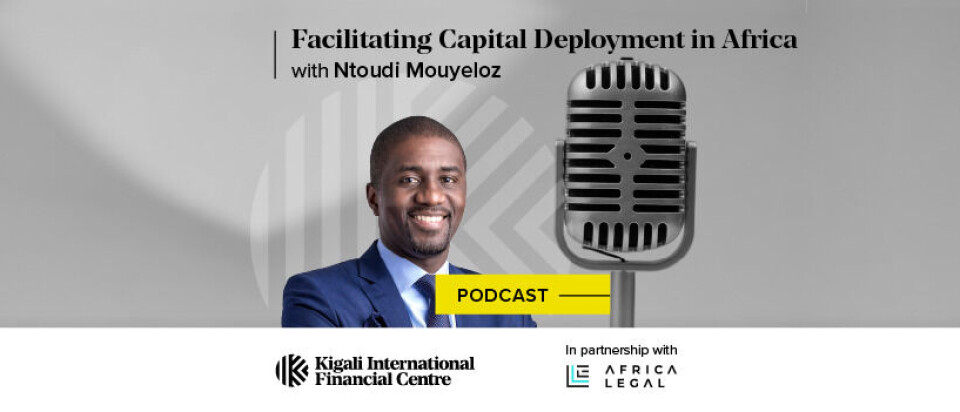Copyright : Re-publication of this article is authorised only in the following circumstances; the writer and Africa Legal are both recognised as the author and the website address www.africa-legal.com and original article link are back linked. Re-publication without both must be preauthorised by contacting editor@africa-legal.com
Realising and Facilitating Investment

Our Africa Legal podcast series returns to Rwanda this week for a conversation with the Kigali International Financial Centre’s new Chief Investment Officer, Ntoudi Mouyelo.
Ntoudi’s interview with Africa Legal is intended to shine a spotlight on the survey, “Realising and facilitating pan-African investment” that is currently underway and aimed at the global business community.
To participate go to: https://www.surveymonkey.co.uk/r/KIFCReport2
By giving input into this survey, the Africa Legal community can assist in developing understanding around the state of capital flow into Africa and the hurdles in the way of future investment.
The results will feed a second report on the opportunities for doing business in Africa and the advantages of channelling this through Rwanda, a burgeoning business and investment hub.
(For an introduction to Rwanda and the Kigali International Financial Centre (KIFC), our first report is available here: ‘A modern Africa. A modern international financial centre’.)
There is no better person to discuss the issues around African investment and Rwanda’s part in making this happen than Ntoudi, a banking and finance executive.
His career has taken him to Luxembourg and Singapore – both financial centres with a broad focus and which the KIFC is now working to emulate.
There are different kinds of financial centres, Ntoudi explains, which focus on domestic, regional, global or offshore agendas.
“What we are developing for Rwanda is a hybrid model – the financial centres that are closer to us are Luxembourg and Singapore. We want to ensure we answer to the domestic agenda but, at the same time, also to the needs of the continent. In that sense our model is unique.”
What immediately puts Rwanda at an advantage in attracting business is that it is trilingual with French, English and Kinyarwanda as official languages and laws drafted in all three. It is this ease of communication which is enabling the country to turn its goal of becoming a financial centre for the whole continent into a reality.
For the centre to achieve this means meeting three key requirements, Ntoudi says.
1) Compliance; “We must align ourselves with global standards.”
2) Transparency of the legal and regulatory framework; “It is key for investors and businesses to feel and perceive predictability and quality when they use the centre.”
3) Access to talent; “We need to have the relevant professionals to answer the needs of those who want to do business.”
Ntoudi explains how the project was part of the Rwandan government’s Vision 2050 which is to increase GDP, further the goals of the African Continental Free Trade Area Agreement and to drive the continent-wide development agenda.
It was Rwanda’s future-focus, propelled by clear and forward-thinking leadership, Ntoudi says, that sparked his excitement in the KIFC project and drew him back to Africa.
“I was convinced that this project of an African international financial centre that is in line with global standards is possible. Today I am proud and happy to see this achievement, that already after two years of development (is becoming a reality).”
To listen to the podcast go to:
